- Home
- Upton Sinclair
A World to Win Page 2
A World to Win Read online
Page 2
In modern days the wealthy had flocked here, and there had been built for them the magnificent Hotel du Parc, surrounded with plane trees; its five stories and broad tower were now crowded by offices of the new government. There were baths all over the place; one of them, the Thermal Établissement, covering seven acres, could take care of thirty-five hundred persons per day; you could float over red marble, or green marble, or mosaic tiles, and later you could stroll in palm-shaded porticoes and chat with your fashionable friends. There was every kind of luxury to be had for a price; the poor clamored for a hunk of tasteless gray bread, but for the wealthy there were still the dainty little brown cubes and the croissants to which they were accustomed. The jewelry shops did a land-office business, both buying and selling; for jewels are the most easily hidden and transported form of wealth—in an extreme emergency they can even be swallowed.
Lanny Budd was an art expert, and wherever he went he renewed his acquaintance with the dealers, and made inquiries concerning private collections. This was not merely the way he earned his living, it was also his camouflage; he had always in his suitcase a file of correspondence, and when it was opened and inspected in his absence—something which happened now in every country of Europe—the most suspicious police spy would be satisfied that the visitor was really the friend of American millionaires and the possible means of bringing real dollars into the poverty-stricken land.
You could never know in what part of France you might find an art treasure. In the dingy ancient mansions which were scattered about this countryside there might be some old work whose value the owner did not realize; or there might be some modern master who had fled from the Nazi tanks and bombing planes, and now was glad to exchange a painting for a loaf of the adulterated gray bread. Lanny strolled into the fashionable dealers’ shops and introduced himself, and looked at what they had to show him and listened to their sales talks. His mind was a card catalog of personalities in “The States” to whom these sights and sounds might or might not appeal, and now and then he would ask a price and shake his head and say that it was much too high.
V
In one of the sidewalk cafés the visitor ordered an omelet and a salad, and while waiting he watched the few rich and the many poor who thronged the sidewalk. There were several million refugees in Vichy France, and as many discharged soldiers who had no place to go and nothing to do; many had no shelter but the trees in the park, and no food but what they could beg or steal. The son of Budd-Erling had been born into the leisure class, and had had to learn to eat his food and digest it, in spite of knowing that there were swarms of people about him who had poor food or none at all. He had been taught that it was their own fault; and anyhow, it had been that way through the ages and would be for ages to come and there was nothing you could do about it. Lanny no longer held that idea, and was trying to do something, after a fashion peculiar to himself.
Now and then he looked at his wristwatch; and presently, having paid his addition, he arose and strolled on. In Paris he had received a letter signed Bruges, telling him of an excellent collection of Daumier drawings which were for sale in Vichy, and adding that the writer of the letter could be seen at the Santé baths at two o’clock any afternoon. Lanny approached the place, but did not go inside; he strolled on the other side of the street at the hour named, and presently he saw, passing the baths, a dark-haired slender man wearing the dungarees and blouse of a peasant of this district. Lanny made sure that the man had seen him, and then he strolled on; out of town, along the banks of the blue Allier which flows through this fertile land, northward until it joins the Loire. Under the shadow of a willow tree he stopped, and the other man joined him and they clasped hands. “Eh, bien, Lanny!” and “Eh, bien. Raoul! How did you manage to get a letter through to Paris?”
“We have our ways,” smiled the younger man, a Spaniard who had lived a full half of his life in France. He had delicately carved features and an ascetic face, as if he had not had a real meal for a long time; but when he met Lanny Budd he was so happy that the blood returned to his cheeks and he flashed a fine set of nature’s own white teeth.
“I was worried about you,” Lanny said. “Can you be safe in this nest of intrigue?”
“I have papers; they aren’t genuine, but I’m all right unless the police should take my fingerprints, and I’ll do my best not to get in their way.”
“You know the terms of the armistice, Raoul. The French must surrender on demand anyone whom the Nazis want, and so long as Laval holds power they will do it.”
“I know; but I have a job with a family who can be trusted. You won’t want me to talk about it.”
“Of course not. Your letter said Daumier, and I suppose that means leftwing politics. What have you to tell me?”
“We have a small center of activity here, and I think it will spread. I need a little money, but mostly I want your advice, what our line should be. Everybody is bewildered, and the main task is to keep them from despair.”
“I know, Raoul, it’s awful. I have a hard time myself.”
“What hope can I hold out to anybody?”
“Britain is going to go on fighting; that I am sure of. The appeasers there have all had to crawl into their holes.”
“But how long can Britain hold out against the entire Continent?”
“Hitler has told me that he means to invade, and I think he means it. But I think the Fleet will stop him.”
“But the air, Lanny! He will bomb all the cities to rubble.”
“He will if he can. Nobody can guess how it will turn out. But this I am sure of, Britain will not quit.”
“And America?”
“We will send what help we can without getting into the war. That is the plan at present. How we’d behave if we saw Britain on the ropes I don’t know. Public opinion over there is changing fast, but whether it will be fast enough, who can say?”
“And what can the French workers do, Lanny?”
“First, you have to give up the class struggle; forget it absolutely. There’s only one enemy now, and that is Hitler. Churchill has to be your friend, no matter how little you like him.”
“That’s pretty hard doctrine for my comrades, Lanny.”
“I know; but it’s the fact, and every one of us has to face it.”
“After what the British did to our Fleet!”
“What else could they do? They gave the French the choice, to be interned, or to go to America, or else to be knocked out.”
“I know; but to the average Frenchman it seemed like a massacre.”
“We can’t appeal to the average Frenchman; we have to reach the exceptional ones, who understand what the enemy is and how many tricks he has. The Nazis want us to hate the British, because Britain is the last bulwark against them; and that tells us what to do. If Hitler can get the use of what is left of the French Fleet he can control the Mediterranean, and take the Suez Canal and the oil of Mesopotamia. That is where the fight is going, and where we have to help.”
“You would advise me to go to Toulon?”
“If you can get any contacts with the sailors, or with the workers in the dockyards and the arsenal—yes.”
Raoul Palma, for nearly two decades the director of a workers’ school in Cannes, could think of one-time students in almost every corner of the Midi. Many had been taken into the army, and their fate was unknown to him. Some had turned Communist, and were now describing this as “an imperialist war.” Some had prospered, and were no longer keen about the cause of the dispossessed. Their ex-teacher sat beneath the grateful shade of a willow tree and wrinkled his brow in thought; presently he said: “I suppose I could manage it, Lanny. Toulon will be a carefully guarded place, and I’ll have to go slow.”
“Do what you can, and remember this: the Nazis may have the power to seize the Fleet, but they haven’t the personnel to operate it. They would need a year or two to train Germans to use all that complicated machinery, and it is there that our hope lies.
Right now the struggle in Vichy is between Laval’s gang, who want to go all out with Hitler, and Pétain and his friends, who want to keep a partially independent France. I spent last night in Laval’s home, so I can give you the straight dope; but you understand, you can’t give any hint how you got it.”
“I’ll suggest a servant as my source.”
“That would go all right. The situation is well known here, and will probably come to a head before long. Either the Nazis will oust Pétain and put in Laval, or Pétain will grow sick of intrigue and treachery and bounce the rascal out on his ear. I have been interested to observe that defeat hasn’t changed the French politicians in the slightest; they are still pulling wires and wrangling; it is still every man against all the rest, and very little of friendship or even party loyalty.”
VI
This was no new role that Lanny Budd was playing. Ever since he had met this young Spanish refugee working in a shoestore in Cannes, and had helped to set him up as director of the workers’ school in an abandoned warehouse with a leaky roof, Lanny had been serving as an unsalaried secret agent, watching the activities of his own class, and bringing items of political and financial information which Raoul would put into unsigned articles for the Socialist and labor press of France. Lanny had been doing the same for his friend Rick, the leftwing journalist in England, and through the years he had had the satisfaction of seeing the workers’ movements coming to an ever clearer understanding of the strategy and tactics of their opponents. Of late years he had been meeting his two friends only in strict secrecy, telling them less about how he got his information and asking less about what they did with it. The Nazis had made that necessary, by the grim efficiency of their Gestapo and its deadly cruelty.
“Where is Julie?” Lanny inquired, and Raoul answered that she had stayed in Paris, having contacts there. That was all; Lanny could guess that Raoul’s wife had been the means whereby Raoul had got a letter to Lanny in Paris. The Germans had cut off all contact between Occupied and Unoccupied France; at least they had in theory. Postal communication was limited to official printed cards containing statements which you could underline or cross out—nothing else. But the boundary between the two sections, curving all the way from the Spanish border on the west to the Mediterranean on the east, extended for a thousand kilometers, and it would have required art army to keep it sealed day and night; all the Germans could do was to shoot persons who were found in the section they didn’t belong in.
These problems the two conspirators discussed in detail. Lanny said: “You can write me from Vichy or Toulon in care of my mother; but don’t expect an early reply. I have to go to London, and from there to New York; then, my guess is, I’ll come back to Vichy, and if there are letters at Bienvenu I’ll get them. But of course nothing except about paintings.”
“I understand,” replied the other. “You must know that I never mention your name. If one of the old-timers asks about you I shake my head sadly and say that I am afraid you are no longer interested in anything except selling paintings.”
“And in my father’s fighter planes. Don’t forget that I’m a merchant of death! I find it convenient in England, for the British need nothing in the world so much as Budd-Erlings, and when it comes to travel permits and plane accommodations. I rank almost with royalty.”
The conference lasted a long time, for they could not meet often, and Raoul wanted to know everything that Lanny could tell about the world situation; the secret purposes of the rulers and exploiters of the different lands, which he would explain to little groups of key workers in the immense dockyards and arsenal of France’s great naval port. Some explaining it would take, if they were to learn to love Winston Churchill, arch Tory imperialist whose battleships had just assaulted and blasted half a dozen of France’s proudest warships in the harbors of Oran and Dakar. But Winnie’s voice was the one that was bellowing defiance to the Nah-zies, as he called them, and the Nah-zies were the number one enemies of everything the workers of the world cherished.
At last Lanny said: “I have to go now; I have an appointment.” He walked back to town alone, for no one must see him in the company of a man in dungarees and blouse, a man who was carrying forged papers, and whose fingerprints would reveal that he was a Spanish Red who had recently been in jail in Toulouse for attempting to protest against the treatment of Spanish refugees in French concentration camps. No, indeed; and least of all if you were on the way to visit the revered personage who until recently had been the French Ambassador to the Madrid Government, and had returned to become head of the newly created État François, newborn successor to the Troisième République, which Pétain in his youth had learned to refer to as la salope, the slut.
VII
The aged Maréchal was established in the Pavilion Sévigné, once home of the lively French lady whose letters were read all over the world. Here he had both home and office, a convenience for one whose powers had waned. It was a large drafty place, all right for the summer, but the old man dreaded to think how it would be when the north winds swept over these broad plains. So he remarked to his visitor, and added, plaintively: “But perhaps I shall not be here then; there are many who would be glad to attend my obsequies.” He knew what a cruel world it was—he, the hero of Verdun, who had lived too long for his own good. His secretaries warned all callers that their stay must be brief, and that they must not say anything to irritate or excite the venerable soldier-statesman.
His hair was snow-white and so was his trim little mustache; his features were wrinkled and his expression tired. He had put off his uniform with seven stars on the sleeve, and also the cap with the three tiers of golden oak leaves; he wore a plain black business suit with a black tie. He was a little, dry, formal man, a martinet accustomed to command, rigid, jealous, self-righteous, and set in medieval ideas. His powers were near their ebb; if your speech was too long you would see his eyelids droop and his head nod. But when you stopped he would lift his cold blue eyes to yours, and would repeat in his quavering voice what he longed to tell all the world: that he had no thought but the welfare of France; a France restored and reformed, a Catholic, God-fearing France, a France obedient and moral, a France purged of all traces of the wicked revolution of a hundred and fifty years ago.
He remembered this good-looking and respectful Franco-American, who had so won his heart that he had addressed him as “mon fils.” “Yes, yes, I met you at Madame de Portes’, que le bon dieu la bénisse! She was a well-meaning woman, wiser than most of her associates.”
When Lanny told the result of his mission, which had been precisely zero, the old gentleman remarked: “No one could have done more.” When Lanny said that he had recently talked with Herr Hitler in Paris, Pétain responded quickly: “I have had to trust him, M. Budd; I had no other course; I appealed to him as one front-line soldier to another; but now and then I wonder whether he has the same sense of honor that we guardians of France have been taught. What do you think, mon fils?”
This was a question which many Frenchmen asked of Lanny Budd, and his reply had become stereotyped. He said that Herr Hitler was a man of moods, and was swayed by those who advised him. Some of these were narrow-minded racists and nationalists; others wanted much the same thing that conservative Frenchmen wanted, a Europe purged of Red agitators and labor demagogues. “No soup is eaten as hot as it is cooked, mon Maréchal, and I have the idea that Herr Hitler’s world will turn out to be much the same as you yourself desire.”
“France was happiest when it was a land of peasants,” declared Henri Philippe Benoni Omer Joseph Pétain. It was one of his favorite themes, and Lanny could assure him that this would be entirely satisfactory to the Führer of the Germans, who wanted to have all the machines in his part of Europe.
A pathetic figure, yearning back to a far-departed age, and buffeted by forces of which he had but the feeblest comprehension. He wanted to use this elegant and cultured American to take his ideas to the New World, and call it to the re
scue of the Old. He told about what he called his “National Revolution”; its motto was: “Labor, family, country.” He preached this agitated sermon until his voice gave out and he had a coughing spell. When he tried to talk about the Fleet, and the infamy which the British had committed, his hands shook and he broke down, and one of his military aides had to come to the rescue. “I will never give up the Fleet, either to the British or Germans!” And then: “Go and see Darlan; he will tell you.” To the aide he added: “Take him to the Admiral.”
VIII
The Ministry of Marine was quartered in the Hotel Belgique, and here next morning the son of Budd-Erling presented himself, having received an appointment by telephone. In these offices there were no crowds and confusion, as in most of the others, for the man at the head was competent and by no means superannuated. He was of Breton descent, Catholic and Royalist, conservative, stubborn, and proud; not so different from one of the English ruling class, who had been his allies until a few weeks ago, and now were … what Lanny Budd had come to find out.
Jean Louis Xavier François Darlan was his name, and four-fifths of it was saintly, but he was surely no saintly character, on the contrary a seadog, famous for the amount of Pernod Fils brandy he could consume, and for cussing and general devilment. He was a man of medium height, broad-shouldered and vigorous, a fighter born and trained. His life had been devoted to building up the French Fleet according to his own ideas; outwitting the politicians and driving out the grafters, what he called “the golden bellies of the republic.” He spoke of it as “my Fleet,” and ruled it with a rod of iron.

 Prince Hagen
Prince Hagen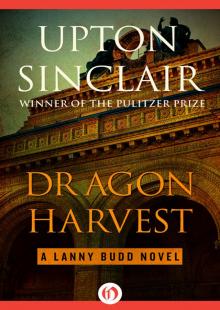 Dragon Harvest
Dragon Harvest The Jungle
The Jungle Sylvia's Marriage
Sylvia's Marriage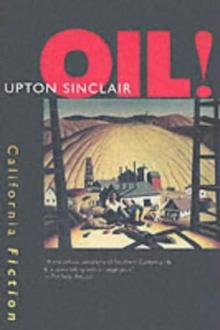 Oil! A Novel by Upton Sinclair
Oil! A Novel by Upton Sinclair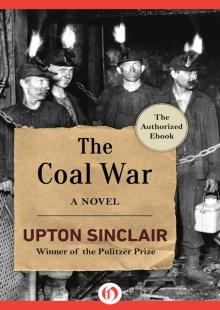 The Coal War: A Novel
The Coal War: A Novel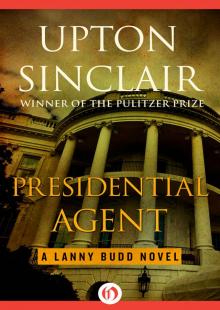 Presidential Agent
Presidential Agent World's End
World's End The Second-Story Man
The Second-Story Man O Shepherd, Speak!
O Shepherd, Speak!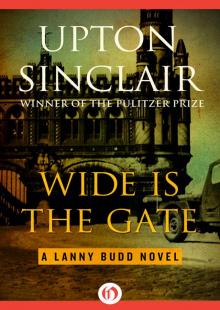 Wide Is the Gate
Wide Is the Gate The Return of Lanny Budd
The Return of Lanny Budd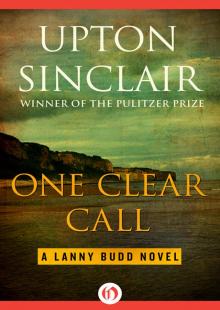 One Clear Call I
One Clear Call I 100%: the Story of a Patriot
100%: the Story of a Patriot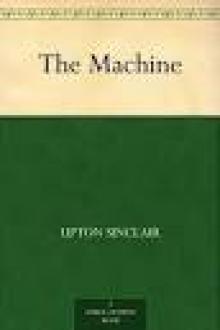 The Machine
The Machine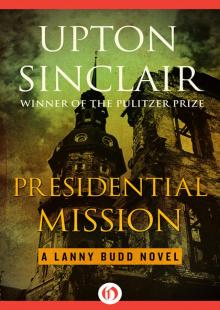 Presidential Mission
Presidential Mission A Cadet's Honor: Mark Mallory's Heroism
A Cadet's Honor: Mark Mallory's Heroism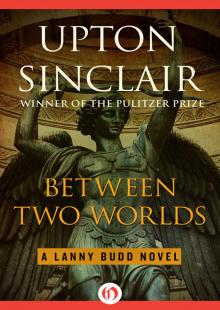 Between Two Worlds
Between Two Worlds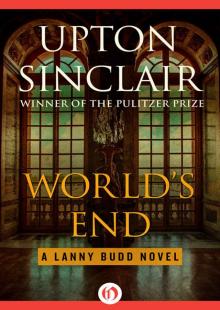 World's End (The Lanny Budd Novels)
World's End (The Lanny Budd Novels)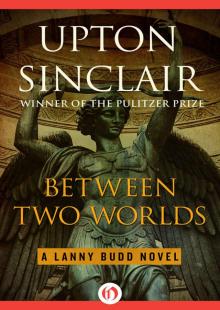 Between Two Worlds (The Lanny Budd Novels)
Between Two Worlds (The Lanny Budd Novels)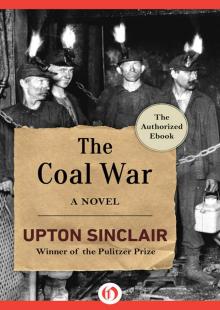 The Coal War
The Coal War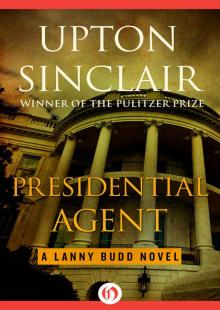 Presidential Agent (The Lanny Budd Novels)
Presidential Agent (The Lanny Budd Novels)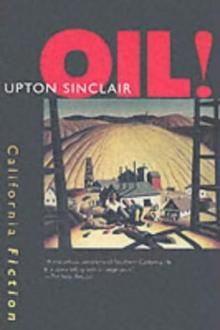 Oil (filmed as There Will Be Blood)
Oil (filmed as There Will Be Blood)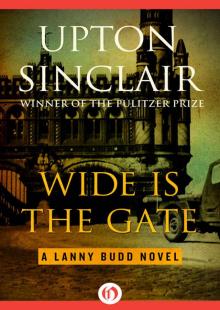 Wide Is the Gate (The Lanny Budd Novels)
Wide Is the Gate (The Lanny Budd Novels)